

New World Order Will Not Be Western-Oriented. I ranian Foreign Minister Mohammad Javad Zarif said the international order has been experiencing a transition and will not be a Western-oriented anymore.
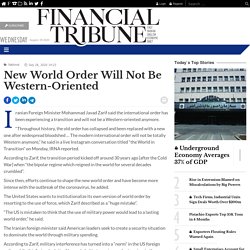
“Throughout history, the old order has collapsed and been replaced with a new one after widespread bloodshed … The modern international order will not be totally Western anymore,” he said in a live Instagram conversation titled “the World in Transition” on Monday, IRNA reported. ID, Wallet, Keys All In Your Hand: Sweden Moves Into The Future With Microchipping. Henry Kissinger & Bill Gates roepen op tot massavaccinatie en wereldbestuur. Gordon Brown calls for global government to tackle coronavirus. Thousands of people in Sweden are embedding microchips under their skin to replace ID cards.
World Order in Post-Coronavirus Era — Valdai Club. China’s Global Infrastructure: Laying the Foundations for a New World Order. The Chinese have invested huge sums in a satellite navigation system, high-speed submarine cables, and other global infrastructure.
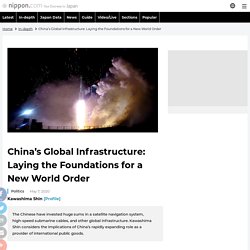
Kawashima Shin considers the implications of China’s rapidly expanding role as a provider of international public goods. The foundations of globalization and global governance were laid by the modern Western powers through their provision of international public goods. New world order on the horizon. Kissinger Still Pushing the Myth of a Happy New World Order. Among the works that first brought Henry Kissinger to academic acclaim was A World Restored, his 1950s book about how the greatest diplomats of Europe met at the Congress of Vienna to restore order to a continent shattered by the Napoleonic Wars.
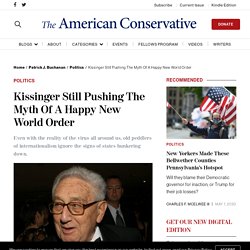
The balance-of-power peace these men achieved lasted—with the significant exception of the Franco-Prussian War of 1870-1871—for the full century, from 1815 to 1914. Writing in The Wall Street Journal Friday, Kissinger declared that it is now an imperative that the world’s leaders, even as they deal with the raging pandemic, begin to make the “transition to the post-coronavirus order.” “Failure to do so could set the world on fire.” Yet, the ingredients Kissinger considers essential for establishing that new world order appear, like ventilators, to be in short supply. “Sustaining public trust,” asserts Kissinger, “is crucial … to international peace and stability.” On Monday, The Wall Street Journal described Europe’s recent behavior thus: Patrick J.
Final Warning: A History of the New World Order. Buchanan: Kissinger's call for a New World Order. Among the works that first brought Henry Kissinger to academic acclaim was “A World Restored,” his 1950s book about how the greatest diplomats of Europe met at the Congress of Vienna to restore order to a continent shattered by the Napoleonic Wars.
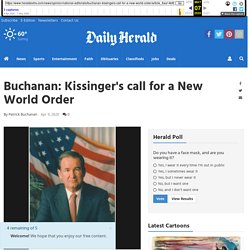
The balance-of-power peace these men achieved lasted — with the significant exception of the Franco-Prussian War of 1870-1871 — for the full century, from 1815 to 1914. Writing in The Wall Street Journal on Friday, Kissinger declared that it is now an imperative that the world’s leaders, even as they deal with the raging pandemic, begin to make the “transition to the post-coronavirus order.” “Failure to do so could set the world on fire.” Yet, the ingredients Kissinger considers essential for establishing that New World Order appear, like ventilators, to be in short supply.
“Sustaining public trust,” asserts Kissinger, “is crucial ... to international peace and stability.” On Monday, The Wall Street Journal described Europe’s recent behavior thus: Gordon Brown calls for global government to tackle coronavirus. Coronavirus Will Change the Nation State and International Order. Rabat – The coronavirus crisis’ management, on national and international levels, will shift political priorities across the globe.
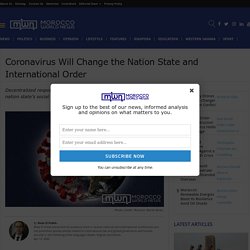
New priorities will emerge from the crisis response, both domestically and globally. Globalisation, technophobia and the world order. A shift from a global village of relatively deeply integrated communities to a form of “gated globalisation” based on political and economic familiarity appears inevitable.
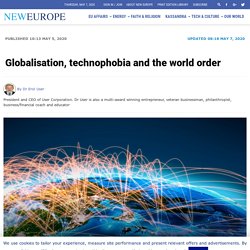
The digitisation of the global economy will only accelerate this process and, perhaps, technology tools may well aid in this. Nearly three decades ago, Francis Fukuyama argued that the imminent collapse of the Soviet Union and the universalisation of liberalism would mark an end to the historical struggle over ideology and political models. His thesis was, by his own recent admission, overly optimistic. The resurgence of strong identities and nationalist leaders has given rise to the politics of resentment and tribalism. Coupled with new shifts in the global balance of power and disruptive technological and industrial processes, it is clear that a new world is upon us. Coronavirus: who will be winners and losers in new world order? Andrà tutto bene, the Italians have taught us to think, but in truth, will everything be better the day after?
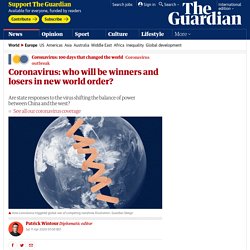
It may seem premature, in the midst of what Emmanuel Macron has described as “a war against an invisible enemy”, to consider the political and economic consequences of a distant peace. Few attempt a definitive review of a play after the first three scenes. Yet world leaders, diplomats and geopolitical analysts know they are living through epoch-making times and have one eye on the daily combat, the other on what this crisis will bequeath the world. Competing ideologies, power blocs, leaders and systems of social cohesion are being stress-tested in the court of world opinion. CPEC & Emerging New World Order - Pakistan Observer. Dr.
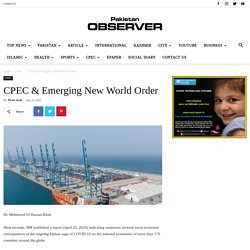
Mehmood Ul Hassan Khan Most recently, IMF published a report (April 25, 2020) indicating numerous severed socio-economic consequences of the ongoing human saga of COVID-19 on the national economies of more than 170 countries around the globe. It has already traumatized the global economy, international financial system and last but not the least, settlement of payments mechanism. Mega projects like China-Pakistan Economic Corridor (CPEC) have become hope of the last resort especially, for the sinking economy of Pakistan and hope for regional weakening economic growth in the days to come. China-Pakistan Economic Corridor (CPEC) and Belt and Road Initiative (BRI) are projects of the 21st Century, inching towards achieving the highest levels of regional connectivity, socio-economic prosperity, energy and food security, reduction of poverty, generation of new jobs and above all agricultural revolution.
CPEC is a model of “sustainable development”. Fairness, equality needed for new world order: PM - Northlines. The coronavirus crisis has shown the world the limitations of the existing international system and the need for a new template of globalisation, based on fairness, equality and humanity, Prime Minister Narendra Modi said on Monday at a video-conference of leaders of the Non-Aligned Movement.
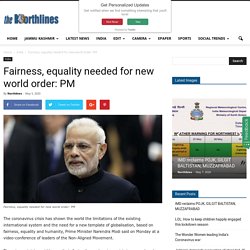
The prime minister said humanity is facing its most serious crisis in many decades and that NAM can help promote global solidarity as it has often been the world’s moral voice. “To retain this role, NAM must remain inclusive,” he said. Without giving any direct reference or naming any country, Modi also said: “Even as the world fights COVID-19, some people are busy spreading other deadly viruses. Such as terrorism. Questionable choices shaping the new world order - Asia Times. When Donald Trump was elected the 45th president of the United States in 2016, many anti-war conservatives and realists, including myself, sincerely hoped that it would mark a change for a better – at least in terms of America’s foreign policy and never-ending wars of the past.
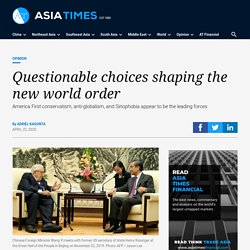
Defeating Hillary Clinton by riding the populist wave that demanded a more nation-focused and less world-oriented commander-in-chief was the ideal. Although many bought into Trump’s electoral promises, few have paid close attention to what in a broader sense his policies could mean not only for US citizens, but also rest of the world dependent on the American leadership firmly established after World War II. Indeed, what we have experienced since Trump came to power is what we could describe as democratic authoritarianism, where by fulfilling populist demands the leader is gathering vast public support and exercising his presidential powers unchallenged. Asia Times Financial is now live. The International Order After COVID-19 by Robert Malley. At first blush, the coronavirus pandemic seems likely to corroborate the argument for deeper international cooperation to confront shared global challenges. But crises tend to intensify and accelerate preexisting trends – in this case, the rise of anti-globalist nativism.
Rising Kashmir Pandemic & new world order. The current pandemic like all the erstwhile ones has brought most of the world to grovel. In fact, from economic to social and to personal activities the life has come to a complete standstill and simultaneously the humankind is bearing the brunt with the profuse cost of life. Taking to this pandemic many experts’ voices have come to the fore. For some, it would ensue into already existing problems to exponentially accelerate while optimistic take of others sees it a chance to the international community to come together to contend with this scourge.
Meanwhile, well-nigh the entire nation-states regime from authoritarian to democratic have been found abdicating from their responsibility to cope with this pandemic at first barring a few like Nordic states. Hence, in such a critical time the essentially pertinent matter to see is how far down the impact of this calamity will have upon us and need to revisit the current global order. Who will lead? Global cooperation will help to surmount.